Transcription of Study Questions - Big Picture Ministries - Big …
1 Study Questions For New Testament Books of the Bible 2 Corinthians Chapter 1 1. Who wrote 2 Corinthians and to whom was this letter written? 2. COMMENTARY SEARCH: Where was this author and when was this letter written? 3. How did Paul identify himself ( )? 4. Why did Paul write this letter (New Living Translation NLT, notes 2 Cor. 1:1)? 5. Why does Paul say God comforts us ( )? 6. What kind of trouble did Paul say he went through in Asia ( )? 7. Why does Paul tell the Corinthians and us about his trouble in Asia (v. 8-10)? 8. Why did Paul want the Corinthians to know he was always sincere and honest in his dealings with everyone ( )? 9. Was Paul being fickle when he changed his plans to visit the church in Corinth a third time? 10. According to Paul, why has the Holy Spirit been placed in our hearts ( )? 11. REFLECTION: Has God comforted you in the midst of troubles?
2 If so, when and how? 2 Corinthians Chapter 2 1. COMMENTARY SEARCH: Determine if the last letter Paul was referring to in verse 3 was 1 Corinthians and explain. 2. Why does Paul say he wrote such a painful letter ( )? 3. Why does Paul encourage the Corinthians to forgive and comfort the church s troublemaker ( )? 4. Why do we need church discipline anyway? 5. Paul says ( ) Our lives are a fragrance presented by Christ to God. What does Paul mean when he says this fragrance is perceived differently by those being saved and those perishing ( )? 6. REFLECTION: Do you think Paul was avoiding a confrontation when he decided not to go to Corinth a third time? Should we avoid confronting others who are in need of correction? 7. REFLECTION: How do you know when another Christian is in need of correction? 8. REFLECTION: How do you know when another Christian in need of correction should be confronted?
3 9. REFLECTION: Write or tell about a time you confronted an adult or Christian in need of correction and how you handled the situation. 2 Corinthians Chapter 3 1. Why did Paul say he needed no letters of recommendation ( )? 2. How are the Corinthians themselves a letter of recommendation for Paul ( )? 3. Paul did use letters of introduction for his aides ( , Phoebe see Romans 16:1-2, and Timothy - see 1 Corinthians 16:10-11). Why did Paul write these letters of introduction (NLT notes 2 Corinthians 3:3)? 4. What does Paul mean when he says the Corinthians are a letter from Christ prepared by Paul and his followers ( )? 5. Paul says, Our only power and success comes from God ( ). How does God give us that power? 6. REFLECTION: In your own words define the old and new covenants. 7. Can someone follow the Old Testament and not the New Testament and receive salvation ( )?
4 Why or why not? 8. According to Paul, why is the New Testament more glorious than the Old Testament ( )? 9. REFLECTION: There are many motivational speakers and books on the market today. What do you think Paul would say about today s motivational strategies and theories? 10. Describe what happens when the Spirit of the Lord is working in us? 2 Corinthians Chapter 4 1. In verse 2, Paul sets an example. As Christians, why is it important for us to follow Paul s example? 2. Why did Paul not lose heart or give up ( )? 3. How did God give Paul his ministry, , describe Paul s conversion experience (see Acts 9:1-31)? 4. What is the difference between a believer that does not understand some aspect of the Bible and an unbeliever who does not understand any of the Gospel ( )? 5. Who is the God of this age? 6. REFLECTION: At what point do you quit trying to convert a nonbeliever to accept the Gospel and salvation?
5 7. What is the treasure and what are the jars of clay (NIV version) Paul is referring to in verse 7? 8. What does Paul mean when he says, We are pressed on every side by troubles, but we are not crushed and broken. We are perplexed, but we don t give up and quit. We are hunted down, but God never abandons us. We get knocked down, but we get up again and keep going. Through suffering, these bodies of ours constantly share in the death of Jesus so that the life of Jesus may also be seen in our bodies ( )? 9. Besides the hope of eternal salvation what are some other reasons we should never give up as Paul says in verse 16? 10. BIBLE SEARCH: Unbelievers do not believe that Jesus is God. Paul says in 2 Corinthians 4:4 that Jesus is the image (exact likeness) of God. Search your Bible and find what other Scriptures support the truth of Jesus exact likeness to God.
6 2 Corinthians Chapter 5 1. What does Paul say to convince us that when we die our body and our soul are not permanently separated ( )? 2. Why do we have to leave our old bodies behind and put on new heavenly bodies ( )? 3. What has God given us as a guarantee of what Paul says will happen after we die ( )? 4. REFLECTION: Paul says that we should live by faith and not by sight, ( ) (NIV). What does this mean to you? 5. What did Paul imply when he said that, as long as we live in these bodies we are not at home with the Lord ( )? 6. As Christians, why must we always strive to please the Lord ( )? 7. REFLECTION and SCRIPTURE SEARCH: Who has the authority to judge humankind ( )? Some people say that a Christian s eternal salvation is secure and therefore believers will not be judged. What is your position concerning the previous statement? Research the New Testament Scriptures and cite several passages that support your position.
7 8. How can we tell false teachers from the real deal ( )? 9. The Greek manuscript says, Since one died on behalf of all, all died. What does this mean ( )? 10. In verse 19, what do we commonly call the wonderful message Paul was talking about? 11. REFLECTION: Paul refers to us as Christ s Ambassadors ( ). How well are you fulfilling your commission as Christ s ambassador? 12. REFLECTION: Our sins were laid on Christ at His crucifixion, and His righteousness is given to us at our conversion. In your opinion, is this a fair trade? 2 Corinthians Chapter 6 1. REFLECTION: Paul begged the Corinthians not to reject God s message ( ). Under what circumstances can we be considered to be rejecting God s message? 2. The Bible talks about the: ---Second Coming of Christ, (see Matthew 25:31, 1 Thessalonians 4:16-17, 2 Thessalonians 2:1, Revelation 22:12) ---Judgment Day, (see Zephaniah 1:8-18, John 12:48, Romans 2:5-10, 2 Peter 3:7) and ---the Book of Life (see Revelation 3:5, 13:8, 17:8, 20:12-15).
8 When is the Day of Salvation? 3. Why do we need to exhibit exemplary behavior at all times ( )? 4. DICTIONARY/ BIBLE SEARCH: Define righteousness (according to the dictionary and then according to the Bible). 5. What purpose does righteousness serve for the Christian? 6. Why do we need an open rather than a closed heart toward God s messengers ( )? 7. REFLECTION: Paul warns us not to team up with unbelievers ( ) and not to isolate ourselves from them either (see 1 Corinthians 5:9-10). The Lord admonishes us to be in the world, but not of the world. Have you ever found yourself crossing the line of being in, but not of, the world? When? How did you get back (or how did you back out of the world)? 8. What s our best defense against such situations (being in and not of the world)? 9. BIBLE SEARCH: Paul quoted at least four passages from the Old Testament in this chapter.
9 Find them (hint: see verses 2, 16, 17, 18). Which passages in the Old Testament did Paul quote from? Name at least one Old Testament Scripture for each of the four passages cited by Paul. 10. REFLECTION: Why do you think Paul used Old Testament Scriptures in this chapter? 2 Corinthians Chapter 7 1. In verse 1, when Paul says, Because we have these promises, dear What promises is Paul referring to? 2. What do we have to do to, work toward complete purity, because we fear God ( )? 3. REFLECTION: Because Paul did not abandon his responsibilities and sent a third (now lost) letter to the Corinthians which he said, ..was painful to you for a little while ( ), it caused the Corinthian church to feel remorse and to change ( ). What lesson can we take from this incident? 4. What does Paul mean when he says, ..sorrow without repentance is the kind (of sorrow) that results in death ( )?
10 Give an example, if you can. 5. REFLECTION: What, in your opinion, is the purpose of Christian discipline, reproval and correction? 6. What changes did the Corinthians make as a result of their Godly sorrow ( )? 7. REFLECTION: How does God use sorrow in our lives? 8. REFLECTION: Did sorrow in your life cause you to seek salvation? If so, explain. 9. What role does Paul say Titus played in this particular episode with the Corinthian church ( )? 10. RESEARCH/REVIEW: What was Paul s purpose in writing this letter? 2 Corinthians Chapter 8 1. What did Paul say about the church in Macedonia in verses 2-4? 2. REFLECTION: The church in Macedonia considered their giving to be a privilege. Do you consider your tithes, free-will offerings and donations to be a privilege or a responsibility? Why? 3. REFLECTION: Do you think the Lord accepts and blesses your gift, if it is given grudgingly with a sense of obligation?
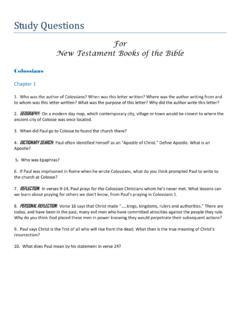
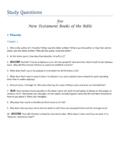
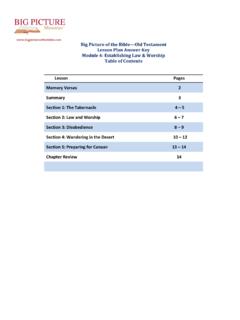
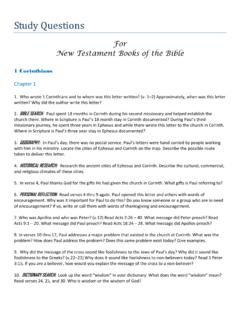
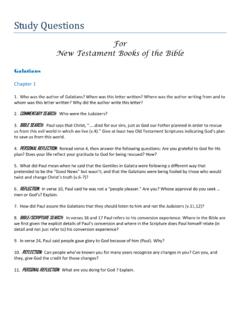
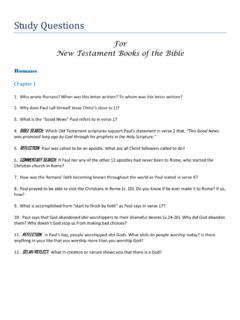



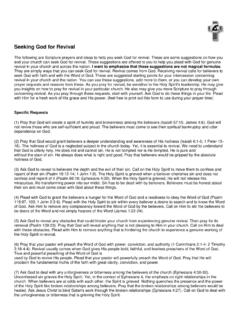



![Moving Forward in Obedience [Sermon Notes] - …](/cache/preview/5/f/a/9/6/e/0/7/thumb-5fa96e07bcf08f0e3068eb4d05bdaec3.jpg)